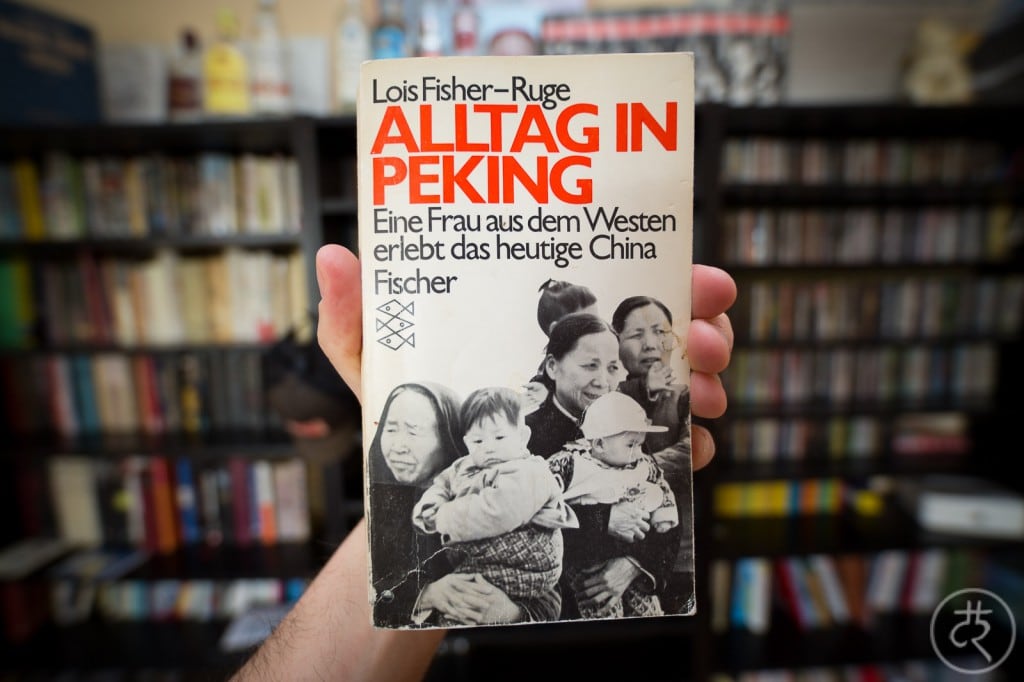killing the siren call of nostalgia
[note: I’ve been reading a German translation]
The story: In 1973, the People’s Republic of China is slowly starting to open up to “imperialists” from the West. US-President Nixon and his aide Kissinger have been warmly received, and now a select few foreign journalists are being invited to live in Beijing for a while. Lois Fisher-Ruge is the American wife of famous German reporter Gerd Ruge. She isn’t exactly exhilarated about the idea of moving to China, but she tags along anyway.
Upon arrival, her life gets wrapped in tightly – with a personal chef, chauffeur, maid, and a translator taking care of her and her husband. Still, she manages to occasionally escape from this “expat-bubble” after picking up a bit of Mandarin and adopting the habit of riding her bike through town.
This book is about China the way Fisher-Ruge saw it, from 1973 until 1976.
desperate housewives?
I didn’t really expect much. Maybe it was because the general idea reminded me so much of Carol Kloeppel‘s book. Or maybe it was because the idea of some random Western person writing about “ordinary life” in China seemed so stereotypical.
Turns out the book is awesome.
It’s not so much the story (Fisher-Ruge eats things, rides her bike, talks to people, sees a riot at premier Zhou Enlai’s funeral, lives through the Tangshan Earthquake and through Mao’s death, and then she leaves). Nor is it Fisher-Ruge’s writing style. She mostly sticks to specific details: how much does a certain item cost? What is the perceived ratio between horse carriages and motor cars on the streets? What do people eat?
Also sometimes, when she offers a personal opinion on things, she gives away a surprising degree of ignorance. For example, the low level of public security in Hongkong (compared to Beijing) makes her feel uncomfortable. This is understandable. But I would have liked for her to note that her perceived safety in Beijing is mostly due to her special status as a foreign visitor. In other words: it is the expat bubble that prevents her wallet from being stolen.
So what makes this book so awesome then?
Lois Fisher-Ruge debunking popular myths
First of all, Fisher-Ruge’s attitude toward China is a sympathetic one. Or rather, she starts out with an air of indifference and grows to appreciate China and her people. Naturally, this makes for a nice read (and it reminded me of William Lindesay‘s book).
The other thing that is special about this book is that Fisher-Ruge, with her depiction of life in China in the mid-1970s, unknowingly helps debunk a bunch of myths about China that are somewhat popular among today’s youth.
I’ll list a few:
- “Back in the days (before the Economic Reform policy of the 1980s), China was a safe place where people used to leave their doors open all the time. Because under Mao, nobody stole anything.” – Wrong. Fisher-Ruge notes that bicycles get stolen all the time in Beijing, and that most low level windows have massive metal bars across them.
- “Back in the days, the air quality in Beijing used to be so much better!” – Partly wrong. Yes, the air quality seems to have taken another turn for the worse in the last few years, but it has never been good. Fisher-Ruge notes that during the time of coal heating, the area of vision in Beijing was about the length of one building block.
- “Back in the days, the people used to help and care for each other!” – Wrong. Fisher-Ruge irritatedly notes that Chinese people are likely to ignore a person who has fallen to the ground in public traffic. One of her Chinese friends offers a possible explanation for this sort of behavior: apparently parents would tell their children not to get involved, because getting involved might mean inviting certain unpredictable “consequences”.
- “Back in the days, there was no corruption in China.” – Wrong. Fisher-Ruge tells us that Baihuodalou (百货大楼) has Rolex watches on sale, which, in her own words: “only Chinese in very high positions could afford”.
Every Chinese of the post-80s generation should read this
Obviously, all of the above is not to say that Beijing used to be less safe than today, that the air quality was worse, or that people were more indifferent towards each other. And the level of corruption has actually seen an increase in the last few decades (the bigger the cake, the bigger the share).
Also, there is always the possibility that Fisher-Ruge’s impressions of life in China are not 100% accurate.
But let’s not forget that Fisher-Ruge displays a strong sympathy for China, and that the book first came out in 1979, during a time when the future of the Economic Reform policy was not certain at all. She’s not exactly a hater.
I wish young Chinese people would read books like this one.
who might want to read this
Fisher-Ruge’s feat of living in China as a privileged expat at the time isn’t worth mentioning. Her storytelling is okay, and so is her writing. It’s nothing special, but it’s not bad. Some of her observations are pure gold, though.
If you’re into China at the time around Mao’s death, or better yet, if you’re someone who likes to romanticize that time, read this book.
Also read: Fernão Mendes Pinto, for a book that is totally different from this one.

